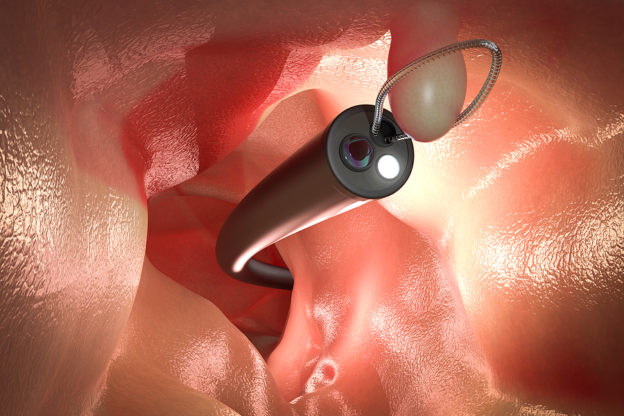By David Blyweiss, M.D., Advanced Natural Wellness
September 11, 2020
I remember my first colonoscopy clearly. I laid down on the table to get prepped for the procedure…
Then, I opened my eyes, looked at the IV nurse, and said, “Okay, I’m ready.” She just looked down at me. “Honey, you’re done!”
Wow! That was quick and easy.
Thinking back, it really wasn’t that scary, but I can understand why so many of my patients feel some nerves.
Colon cancer is actually one of the more preventable and treatable cancers – if it’s detected early. If it’s not detected early, it can be quite deadly.
The American Cancer Society expects 147,950 cases of colorectal cancer for the US in 2020. Of these, about 53,200 people – mostly over the age of 50 – are expected to die from the disease.[1] What’s concerning is that there has been a 51% increase in colorectal cancer among those under age 50 since 1994.
That’s why regular screening, while unpleasant, is important for everyone.
Anyone with an average risk of the disease should begin regular screening by the age of 45…or earlier if your normal bowel habits become not normal for you. This could include either a stool-based test or a visual exam in the form of a colonoscopy. [2]
There are two important things you should know when going into your first colonoscopy…
MD Exposes the Hidden Danger to Your Eyes

When your eyesight starts to fail, it's a real problem. Suddenly you can't go to the grocery store... you can't get to the doctor if you have an emergency... you can't meet your friends for dinner…
Your "regular" doctor doesn't have time to keep up with the latest research. And the same goes for eye doctors. They go to school to learn how to fit you for glasses and contacts, but have no way of preventing the damage and loss of eyesight that threatens your freedom and independence.
Let me show you something that explains a LOT about how your eyes work.
In my FREE Special Report, I'll show you a HUGE, untapped resource for your eyes that safely and naturally restores clear, effortless eyesight.
Click here to get started...
1st – Choose Your Doctor Carefully
Choose a trusted doctor to perform your screening. The last thing you want is a doctor who is not extremely familiar with the process. He or she needs to know how to deal with every scenario.
That’s because colonoscopies with polyp removal result in serious complications about 0.5% of the time. This means your odds of injury from colonoscopy are actually slightly higher than your odds of getting colorectal cancer in the first place![3]
So choose a doc who performs a lot of colonoscopies. It’s considered a routine test, and general practitioners can perform them in outpatient settings. But you’d be much better off with a doctor who specializes in the procedure and has access to hospital equipment in case of a complication.
Most doctors know how people’s intestines are supposed to look, but we can never know exactly when someone will come along with an extra loop or kink in their bowels that might cause problems with the scope.
One way to work around this is to ask your doctor to use a pediatric scope which is smaller in size and extra flexible.
You’ll also want to choose a trusted facility that uses proper sterilization procedures. An unclean scope can introduce bad bacteria to your system and cause major problems.
2nd – Clean Out Your Bowels Naturally
After you’ve scheduled your procedure with a trusted physician, you’ll want to prepare your body for the exam.
Make sure your bowels are fully cleaned out and ready to go for the procedure. Otherwise, your doctor will stop half way through and tell you (after you wake up) to reschedule for another day.
The standard prep for a colonoscopy is to drink a foul tasting saline laxative called magnesium citrate. This special drink will help clear out your system.
Unfortunately, it also tends to leave people doubled over in pain for a day and night – running frequently to the restroom.
To help the process along and increase your comfort, try using some of these natural techniques along with your doctor’s drink cocktail.
Are You Suffering From...
- Love handles and a pot belly
- Romance that isn't what it used to
- Forgetfulness and inattention
- Low (or no) strength and endurance
- A sex drive that's shifted into neutral...or worse
If so...you may have Mature Male Burnout. Click here to discover more about this unique condition and what you can do about it.
Fast Longer: Your doctor will tell you to eat only a liquid diet for the day before your colonoscopy. I suggest you also eat very lightly three days before your exam. This slightly longer, gentler fast will be better than the fast and painful type most people experience.
Vitamin C: During this time, increase your Vitamin C intake to help move your bowels along naturally.
Go on a Liquid Diet: After your day of eating lightly, go on a full liquid diet two days before your colonoscopy. Transition to clear liquids only for the day before.
Magnesium Citrate: You’ll take a bottle of magnesium citrate on the evening before your procedure. It’s an over-the-counter laxative that works to clear out your system.
Stay Hydrated: Drink plenty of liquids to help your bowels flush out cleanly. I recommend healthy clear liquids instead of the sugary Gatorades and salty chicken bullion most doctors recommend.
Try drinking coconut water, homemade chicken broth, and juices mixed with seltzer. Also, stay away from red or purple dyes as they can interfere with your colonoscopy.
Despite these natural methods, it is still likely you will experience some diarrhea. Hopefully, these steps will help avoid too much excessive cramping and gas.
Then, when the day of your test rolls around, you’ll go into the medical facility to be prepped for the procedure.
Here’s a bit of personal advice you might not hear anywhere else… After your colonoscopy, plan to take the rest of the day off. You’ll want to go home and sleep the drugs off for a while to recover from the experience.
Some Tests Let You Skip It Completely!
If you’re looking for alternatives to regular colonoscopies, there are a few less invasive ways to do regular screening.
Recently fecal blood tests have become more and more common. Ask your doctor about the fecal immunochemical test (FIT) and the fecal occult blood test (FOBT).
The FIT is more sensitive when it comes to early-stage cancer and relevant tumor detection, but the FOBT isn’t far behind.[4]
Rather than visually examining your colon, these tests look for small amounts of blood in your stool as signs of early cancer or polyps.
Cologuard® is a specific type of test that looks for tiny amounts of blood while also looking for certain DNA biomarkers and genes found in colon cancer.
Anyone who has positive results from these tests will need to have a follow-up colonoscopy. Typically around 83% of them are likely to have polyps or hemorrhagic lesions. And 75% of those with positive results are apt to have precancerous polyps.[5]
As a final note, it’s worth mentioning a few things you can do to cut your risk of colon cancer…
Eat less meat – especially barbecued and processed meat.
It’s also important to have complete and regular bowel movements so toxins don’t sit in your system for a long time. I recommend using something like the Squatty-Potty if you have trouble emptying your bowels regularly.
And as food author Michael Pollan has said “eat food, not too much, mostly plants.”
Sources:
[1] Siegel RL et al. Colorectal cancer statistics, 2020. CA Cancer J Clin 2020 Mar 5; [e-pub]. (https://doi.org/10.3322/caac.21601) https://www.jwatch.org/na51140/2020/03/24/colorectal-cancer-2020-epidemiological-update
[2] American Cancer Society Guideline for Colorectal Cancer Screening, June 29, 2020 https://www.cancer.org/cancer/colon-rectal-cancer/detection-diagnosis-staging/acs-recommendations.html
[3] Levin TR, et al. Complications of colonoscopy in an integrated health care delivery system. Ann Intern Med. 2006 Dec 19;145(12):880-6.
[4] Oort FA, et al. Colonoscopy-controlled intra-individual comparisons to screen relevant neoplasia: faecal immunochemical test vs. guaiac-based faecal occult blood test. Aliment Pharmacol Ther. 2010 Feb 1;31(3):432-9.
[5] Knowledge of Positive Cologuard Test Improves Colonoscopy Performance, Mayo Clinic Study Shows. Press Release. Mayo Clinic. May 2016.







